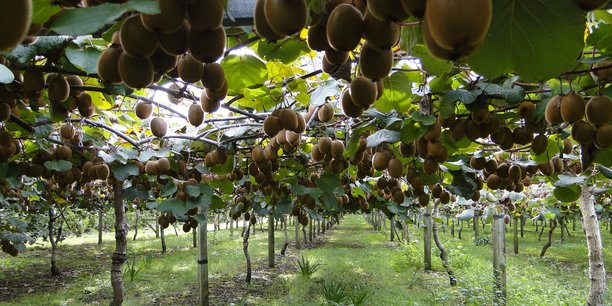
Kiwi fruit producers are particularly affected by climate change
Too much water in winter, above all, not enough in summer. Kiwi fruit producers, three-quarters of their volumes are produced in the southwest, from Lot-et-Garonne to Pyrénées-Atlantiques via Occitanie, are particularly affected by the effects of climate change. This is evidenced by the succession of heavy rains last winter and severe drought and cold this summer. “I’m lucky, my farm is on the hillsides, so it was not flooded”, Olivier Dubuis, producer at Sault-de-Navailles (Pyrénées-Atlantiques), admits. This is not the case with its counterparts on the fertile lands of the Nive and Adour, two rivers that flowed into the sea at Bayonne and flooded last December, just as they did in December 2020.
“The lake level has never been this low before…”
But in recent months, it has been the opposite and the water shortage has become stark:
“Hail, we know how to live with it. I’ve destroyed the first harvest and others since then, replanting it every time. But in 42 years, the lake level hasn’t been so low…”Olivier Dubuis worries.
It must be said that kiwi consumes especially large amounts of water: “It grows on lianas, which, unlike fruit trees, cannot regulate their needs. They do not tolerate much or little water”This specialist explains. In addition, to watering during the summer, which is certainly done more precisely, the use of water is added, in winter, as protection against freezing. For these reasons, “Even if the kiwi requires less work and is less prone to diseases and aggressors”, that this farmer has already reduced the number of plants of this hairy fruit from eight to two hectares. He is also considering giving up his plan to start growing yellow kiwi, which has grown in popularity since its introduction some fifteen years ago.
“In addition to five hectares of apples and five pears, I will continue to expand the surface for apricots, peaches and nectarines, accustomed to the hot climate”Olivier Dubuis explains, with some regret. Because he was among the “Pioneers” of kiwi, from 1965 they introduced the hairy fruit in France and especially in the Adour Valley thanks to Henri Pedelucq, whose son still grows it in Saint-Etienne-d’Orthe (Landes) and sells it through the International Kiwi Data Company (SIKIG). The latter has worked to obtain the Label Rouge as well as the IGP (Protected Geographical Indication), Kiwi de l’Adour, so that the French kiwi is synonymous with quality for consumers (4.6kg consumed per household per year) and better reward for the producers.
“Farms resumed for two years”
The balance of the sector has always depended on the volumes produced in other countries. Today, 1,500 producers harvest this fruit between October and November on a total area of 3,777 hectares in France, according to the National Bureau of Kiwis (BIK), making France the sixth largest producer in the world and third in Europe. Native to China, the kiwi was popularized by the New Zealand nursery Hayward Wright, after which it was named the most widely grown variety. New Zealand remains the world’s leading producer of this fruit, which is able to withstand entire weeks of sea transport. In addition, the domestic company produces Zespri, number one in the world, under license in other countries, including France, but also more recently in Chile and Portugal.
Changing climatic conditions make the equation more complex for kiwi growers, while the construction of rainwater storage tanks is not always viewed favorably in France. Is kiwi cultivation in the southwest threatened in the short term? “New Producers Matter”BIK reports. Among them are the producers of foie gras, for whom kiwi is a welcome variety. “Planting resumed for two years, but it will not produce until its fifth year.”adds the profession that fears the momentum will slow not only due to lack of water, but also “Quality enough land.”

“Organizer. Social media geek. General communicator. Bacon scholar. Proud pop culture trailblazer.”
